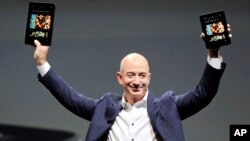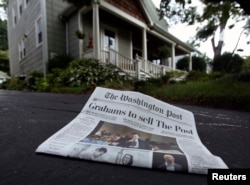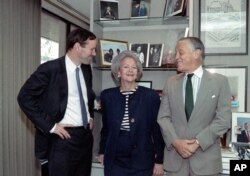Amazon CEO Jeff Bezos’ recent purchase of The Washington Post has sparked speculation – and hope - that whatever the path he charts for the ailing daily might help halt the decline of the newspaper industry as a whole.
Bezos, who has no journalism background, can bring fresh thinking and skills from a different vantage point to The Post, according to Amy Mitchell, director of Pew Research Center’s Journalism Project in Washington. His deep pockets, she says, will allow him to experiment and take a long-term approach to strengthening the newspaper.
“This is a man who understands digital technology,” said Alan Mutter, media consultant and professor at the University of California at Berkley. He said Bezos understands the digital consumer and modern data-reliant marketing and has over $25 billion of his own money to see his projects through.
Making bold decisions
Bezos, Mutter said, will try things most other publishers “either can’t think of doing, or even if they thought of them, would not have the money to do. And even if they had the money to do and could think of them, they’d be afraid to try it.”
While nobody knows what’s in store for The Post, Colorado-based media analyst Steve Outing said Bezos will be able to make “bolder decisions” than anybody before him because he does not have to answer to shareholders or directors. And that includes deciding what to do with the traditional print edition, “which continues to decline in circulation and advertising revenue,” said Outing.
Mutter suggested that The Post’s print edition will probably continue publication for the immediate future. But then, he said, Bezos will be “more active in pushing for innovation and change on the digital side of the business.”
Eventually, Mutter said, Bezos could decide against printing every day as online news fills in the gap.
The decline of print
Given declining circulation and print revenues, a trend that is likely to continue, Outing said the newspaper industry is trying to make a digital transition without giving up the still substantial revenues coming from the print side.
“The average newspaper gets about 85 or 90 percent of its revenue from the print product, either by selling advertisements or charging consumers to buy a copy of the product or to have it delivered to their home,” said Mutter. “So the entire economic basis of the industry right now, today as we speak, is based on print.”
Mutter points out, though, that newspaper advertising revenue has fallen from a record high of $49 billion in 2005 to less than half that today. And newspaper circulation has declined by about 40 percent as advertisers follow audiences increasingly using digital devices for news and entertainment.
These trends have been underway without letup for at least seven years, Mutter says, and warns that if they continue, publishing companies that can’t develop profitable digital products could fall by the wayside.
Media analyst Outing in Colorado says those risks are largely the fault of the publishers.
“Most newspaper owners and executives weren’t really able to think long-term,” said Outing. “They wanted to keep print revenues coming, which cut into resources needed for digital innovations and ventures.”
Mitchell of the Pew Research Center echoed those sentiments, saying the publishers were slow to adapt to the evolving digital environment. She recalled The Post’s owner, Donald Graham, telling his staff when he announced the sale to Bezos that “the newspaper business continued to bring up questions that we had no answers to.”
A breath of fresh air
But Mitchell was optimistic that Bezos could “bring some of that skill and knowledge and expertise to help the industry find its place.”
Mutter is even more optimistic about Bezos’ role in the coming years.
“Every single publisher will be watching every move that he makes …,” Mutter said, because he will be “their champion. He’s going to try and slay the dragon and find a new model for newspaper publishing in the 21st century.
“If anybody has a chance of being successful, he’s the man.”
Bezos, who has no journalism background, can bring fresh thinking and skills from a different vantage point to The Post, according to Amy Mitchell, director of Pew Research Center’s Journalism Project in Washington. His deep pockets, she says, will allow him to experiment and take a long-term approach to strengthening the newspaper.
“This is a man who understands digital technology,” said Alan Mutter, media consultant and professor at the University of California at Berkley. He said Bezos understands the digital consumer and modern data-reliant marketing and has over $25 billion of his own money to see his projects through.
Making bold decisions
Bezos, Mutter said, will try things most other publishers “either can’t think of doing, or even if they thought of them, would not have the money to do. And even if they had the money to do and could think of them, they’d be afraid to try it.”
While nobody knows what’s in store for The Post, Colorado-based media analyst Steve Outing said Bezos will be able to make “bolder decisions” than anybody before him because he does not have to answer to shareholders or directors. And that includes deciding what to do with the traditional print edition, “which continues to decline in circulation and advertising revenue,” said Outing.
Mutter suggested that The Post’s print edition will probably continue publication for the immediate future. But then, he said, Bezos will be “more active in pushing for innovation and change on the digital side of the business.”
Eventually, Mutter said, Bezos could decide against printing every day as online news fills in the gap.
The decline of print
Given declining circulation and print revenues, a trend that is likely to continue, Outing said the newspaper industry is trying to make a digital transition without giving up the still substantial revenues coming from the print side.
“The average newspaper gets about 85 or 90 percent of its revenue from the print product, either by selling advertisements or charging consumers to buy a copy of the product or to have it delivered to their home,” said Mutter. “So the entire economic basis of the industry right now, today as we speak, is based on print.”
Mutter points out, though, that newspaper advertising revenue has fallen from a record high of $49 billion in 2005 to less than half that today. And newspaper circulation has declined by about 40 percent as advertisers follow audiences increasingly using digital devices for news and entertainment.
These trends have been underway without letup for at least seven years, Mutter says, and warns that if they continue, publishing companies that can’t develop profitable digital products could fall by the wayside.
Media analyst Outing in Colorado says those risks are largely the fault of the publishers.
“Most newspaper owners and executives weren’t really able to think long-term,” said Outing. “They wanted to keep print revenues coming, which cut into resources needed for digital innovations and ventures.”
Mitchell of the Pew Research Center echoed those sentiments, saying the publishers were slow to adapt to the evolving digital environment. She recalled The Post’s owner, Donald Graham, telling his staff when he announced the sale to Bezos that “the newspaper business continued to bring up questions that we had no answers to.”
A breath of fresh air
But Mitchell was optimistic that Bezos could “bring some of that skill and knowledge and expertise to help the industry find its place.”
Mutter is even more optimistic about Bezos’ role in the coming years.
“Every single publisher will be watching every move that he makes …,” Mutter said, because he will be “their champion. He’s going to try and slay the dragon and find a new model for newspaper publishing in the 21st century.
“If anybody has a chance of being successful, he’s the man.”







